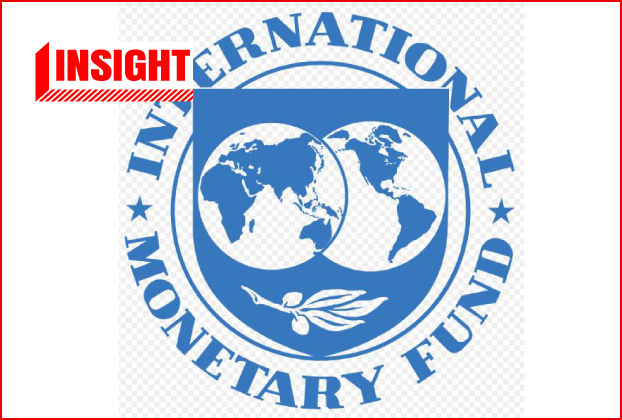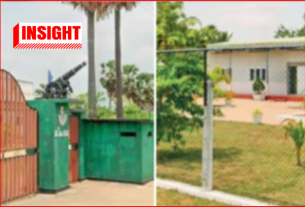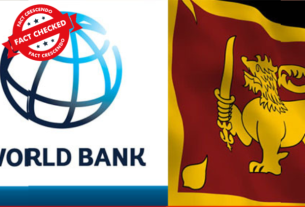Subscribe to our WhatsApp Channel
Sri Lanka recently signed a Debt Sustainability Analysis (DSA) agreement under the International Monetary Fund’s (IMF) guidance. As the upcoming elections approach, there has been significant social media discussion about the possibility of renegotiating this agreement. Our investigation delves into whether a DSA agreement can indeed be renegotiated.
Social Media Posts
A viral post on social media says it`s likely impossible to renegotiate the DSA agreement and further states that there are no international examples of such a process.
Below is the full content of above post.
DSA Mambo-Jumbo Set in Stone: JVP Misleading the Public!!! Here’s the Truth
You can think of a Debt Sustainability Analysis (DSA) agreement with the IMF as being somewhat similar to the assessment a bank does before granting a loan to an individual or business.
In this comparison there are few important points to consider:
– Commitments and Income: Just like a bank looks at an applicant’s income and existing financial commitments to assess their ability to repay a loan, the IMF analyzes a country’s current and future economic performance, including revenue generation, expenditure, and growth projections.
– Assets: The bank considers the assets that the applicant owns as a form of security. Similarly, the IMF looks at a country’s assets (such as natural resources, export revenues, and economic potential) to determine its ability to meet future debt obligations.
– Risk of Default: If the bank feels the applicant might not be able to repay the loan, they might not approve it or might offer less favorable terms. Similarly, if the IMF’s DSA finds that a country’s debt levels are too high and likely unsustainable, the country may need to make significant adjustments or seek debt restructuring.
So, just as a bank ensures that a loan is manageable for an applicant, the IMF uses the DSA to ensure that a country’s debt is sustainable and that it can handle future financial commitments.
So just like you can’t typically ask a bank to change its loan assessment halfway through the process, a country can’t easily request the IMF to change its Debt Sustainability Analysis (DSA) once the assessment is done and an agreement is in place.
The DSA is a critical part of the IMF’s decision-making process, determining the terms and conditions of any financial assistance. If circumstances change significantly after the DSA is completed, the country may need to negotiate with the IMF for a new assessment, but this would involve a detailed process, just like renegotiating loan terms with a bank.
So, once the assessment is set, it’s generally not something that can be altered on the fly. just like your bank loan.
If a party or group claims that they can negotiate and change the Debt Sustainability Analysis (DSA) with the IMF after the loan process has already begun, that would be misleading. The DSA is a key part of the agreement between a country and the IMF, determining the terms under which financial assistance is provided. Once the DSA is finalized and an agreement is in place, it is not something that can easily be renegotiated or changed on a whim.
Making such a claim would indeed be an attempt to fool the public, as it implies a level of flexibility in the process that simply does not exist. The DSA is based on detailed economic assessments, and changing it would require a substantial renegotiation process with the IMF, which is not a simple or guaranteed outcome.
Countries might attempt to adjust the terms of their agreement with the IMF or request additional flexibility if their economic situation significantly changes, but this does not mean renegotiating the DSA itself. Instead, they might seek additional support or adjustments within the framework of their existing agreement. If the situation is severe enough, it could potentially lead to a new agreement or program altogether, but not a simple renegotiation of the original DSA.
There is no known precedent of a country successfully renegotiating a DSA halfway through its implementation, which highlights the importance of getting the initial analysis and agreement right. Therefore, claims that a DSA can be renegotiated post-agreement are misleading and it is an attempt to deceive the public.
We decided to search on this.
Explanation
1. Renegotiation of DSA Post-Agreement
Can a country renegotiate the terms of a DSA with the IMF after the assessment has been completed and an agreement is in place? If so, under what circumstances could this occur?
Yes, a country can renegotiate the terms of a Debt Sustainability Analysis (DSA) with the International Monetary Fund (IMF) after the assessment has been completed and an agreement is in place. Renegotiations typically occur under circumstances where a country’s economic situation changes significantly, making the original terms of the DSA unfeasible or counterproductive to economic recovery.
Circumstances for Renegotiation:
Economic Shocks: Sudden and unforeseen economic shocks, such as a sharp decline in commodity prices, a natural disaster, or a global financial crisis, can necessitate renegotiation.
Political Instability: Political changes or instability that affect a country’s ability to implement agreed-upon reforms may also lead to renegotiation.
External Support: Changes in the availability of external financial support, such as new loans or grants from other international organizations or countries, can influence the terms of the DSA and may require adjustments.
International Example:
Greece (2015): Greece renegotiated its IMF program during the Eurozone crisis after failing to meet its fiscal targets. The renegotiation led to an extension of the program and additional financial support from the European Stability Mechanism (ESM) and the IMF .More details can be read here
2. Precedent for DSA Renegotiation
Are there any known instances of a country successfully renegotiating a DSA after the implementation process has begun?
Yes, there have been instances where countries successfully renegotiated their DSA after the implementation process had begun. Renegotiations typically occur when the initial assumptions underlying the DSA no longer hold, requiring adjustments to the debt restructuring terms.
Examples:
Argentina (2001-2005): After its 2001 default, Argentina entered into negotiations with the IMF and creditors to restructure its debt. The initial DSA was based on assumptions that proved overly optimistic, leading to a renegotiation of terms in 2005 that included a significant reduction in the face value of the debt .More details can be read here
Jamaica (2013): Jamaica renegotiated its IMF program under the Extended Fund Facility (EFF) after the country struggled to meet fiscal targets due to economic challenges. The renegotiation led to a revised agreement with different fiscal targets and a longer timeline .More details can be read here
3. Flexibility in IMF Agreements
If a country’s economic situation changes significantly after a DSA is finalized, what options are available within the existing agreement? Would this typically lead to a new agreement or program, or could adjustments be made within the current framework?
When a country’s economic situation changes significantly after a DSA is finalized, the IMF offers flexibility within the existing agreement, but the extent of this flexibility depends on the nature of the changes and the severity of the situation.
Options Available:
Program Reviews and Revisions: The IMF conducts regular reviews of its programs, during which terms can be adjusted. If the situation warrants, these reviews can lead to modifications in fiscal targets, policy measures, or structural benchmarks within the existing program.
Augmentation of Access: If additional financing is required, the IMF can increase the financial resources available to a country under the existing program.
Extensions: The duration of the program can be extended to allow more time for the country to achieve its objectives.
New Agreement or Program:
If the changes are profound, the IMF and the country may agree to terminate the existing program and negotiate a new one that better reflects the current economic realities. For example, a country might transition from an IMF Stand-By Arrangement (SBA) to an Extended Fund Facility (EFF) if the challenges are deemed to require longer-term support.
International Example:
Pakistan (2019): Pakistan entered into an Extended Fund Facility with the IMF, which was later reviewed and adjusted due to the COVID-19 pandemic. The IMF allowed for more fiscal flexibility within the existing program framework to address the economic fallout from the pandemic .More details can be read here
More details about renegotiations can be read here
Follow us and stay up to date with our latest fact checks.
Facebook | Twitter | Instagram | Google News | TikTok

Title:Can a DSA Agreement with IMF be Renegotiated?
Fact Check By: Fact Crescendo TeamResult: Insight






